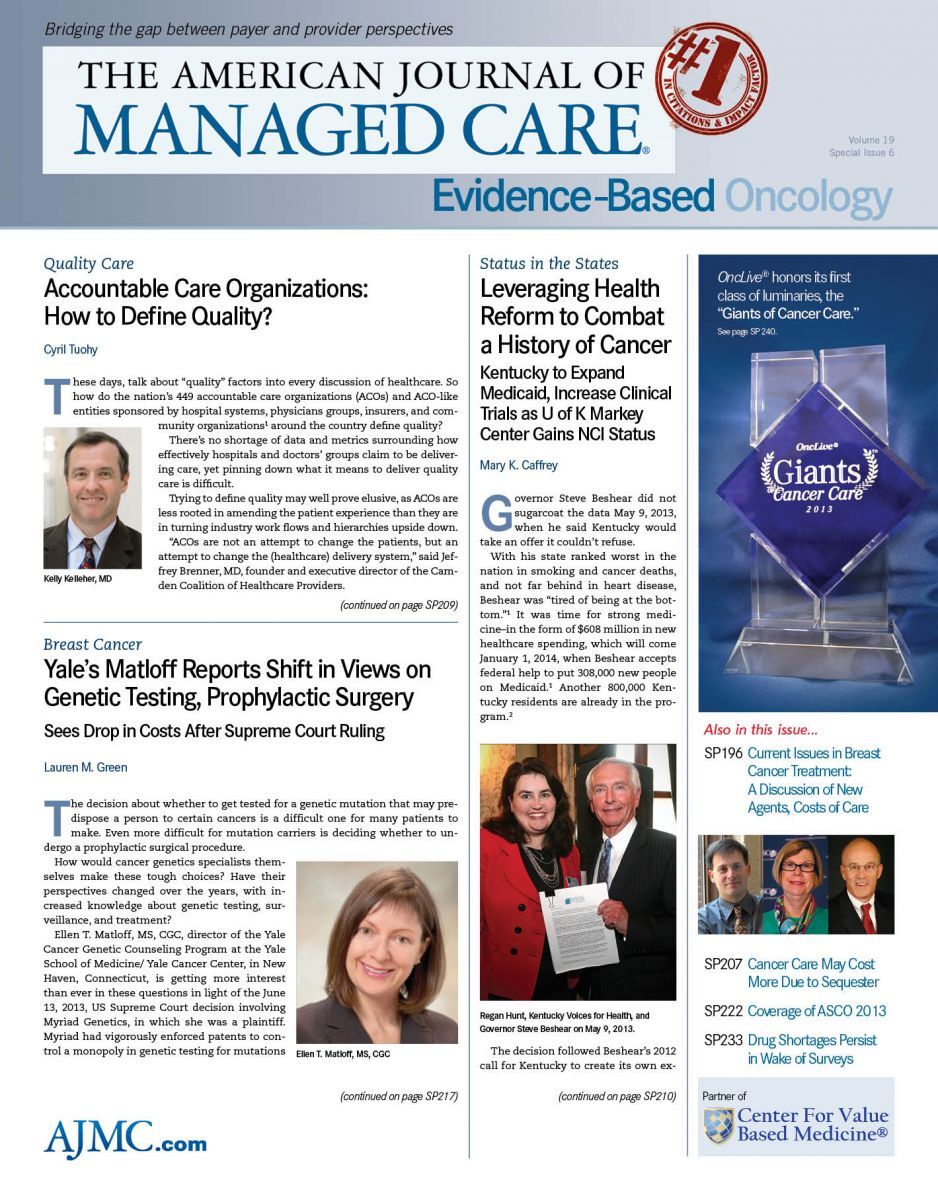- Center on Health Equity & Access
- Clinical
- Health Care Cost
- Health Care Delivery
- Insurance
- Policy
- Technology
- Value-Based Care
Early Results Robust for New Immunotherapy Agent
An antibody that targets the programmed death ligand 1 (PD-L1) to unleash the body’s immune system has demonstrated a 21% response rate in a phase I study of patients with multiple solid tumors, setting the stage for an advance in immunotherapy with broad implications for treatment. MPDL3280A produced durable responses with no dose-limiting toxicities and a favorable adverse-event profile in heavily pretreated patients, according to Roy S. Herbst, MD, PhD, a professor of Medicine at Yale Cancer Center and chief of Medical Oncology at Smilow Cancer Hospital at Yale-New Haven in Connecticut.
“This therapy has the potential to be used in almost every tumor type,” Herbst said in an interview. “It’s just the tip of the iceberg so far. We’re still figuring out exactly what the right biomarker is going to be to predict the most responsive population.”
Herbst previewed the findings during a press conference held in advance of the 2013 ASCO Annual Meeting. In the study, MPDL3280A was administered intravenously every 3 weeks to patients with metastatic tumor types including non—small cell lung cancer (NSCLC), melanoma, colorectal cancer, gastric cancer, and renal cell carcinoma. Responses were assessed with computed tomography scans every 6 weeks for 6 months, and then every 12 weeks.
In all, 29 of 140 evaluable patients (21%) exhibited tumor shrinkage according to RECIST criteria, with the highest overall In all, 29 of 140 evaluable patients (21%) exhibited tumor shrinkage according to RECIST criteria, with the highest overallMoreover, only 2% of the participants (4 patients) experienced grade 3/4 AEs that were deemed to be immune-related, and only 1 patient discontinued treatment because of an immune-related AE.
“We didn’t see any high-grade pneumonitis, which makes us feel very optimistic that this drug, because it’s hitting only the PD-L1, is probably sparing some of the mechanisms that would allow for the lung to become inflamed,” Herbst said in the interview. “We saw a couple of episodes of hepatitis and liver inflammation, but really, it’s a very mild toxicity profile.”
Findings Generate Excitement
MPDL3280A is the latest example of the checkpoint blockade anticancer strategy pioneered with the development of ipilimumab (Yervoy), which unlocks the power of the immune system by targeting CTLA-4. The US Food and Drug Administration approved the melanoma drug in 2011. One of the highlights of the ASCO meeting last year was research into BMS-936558, now called nivolumab, which targets PD-1. Research into the agent was also presented at this year’s meeting.
Herbst said the efficacy demonstrated thus far in attacking PD-L1 and other immune checkpoints “gives us the opportunity to open up a whole new avenue of therapy in cancer.” Tumor cells express PD-L1, which in turn binds to the T-cell receptors PD-1 and B7.1, Herbst said. “As long as there’s PD-L1 on the surface of the tumor, the T cell PD-1 sees it as a friend,” he said. “It is cloaked and it doesn’t recognize the tumor as a foreign body and it doesn’t kill it. But as soon as that PD-L1 goes away—by blocking it with an antibody—the tumor becomes visible, the target can be lit up, you go after it, and the Tcell attacks and kills it.”
Herbst said the therapeutic strategy could apply to a variety of cancers. “Any tumor type that has mutations is going to have the potential to be immunogenic and to work in this way to activate the immune system,” he said, adding that “a lot of patients don’t have a driver mutation that’s easily targetable.”
Since MPDL3280A has been engineered for enhanced safety, the agent could potentially be combined effectively with targeted therapies or with chemotherapy, Herbst noted. “The ability to combine this is going to be extraordinary,” he said.
The MPDL3280A study is continuing with an expanded cohort of patients with a larger range of solid tumors and blood cancers; more than 275 patients have been enrolled, according to an ASCO press release. Genentech, which is developing the drug, also is investigating MPDL3280A in separate phase I trials in combination with vemurafenib (Zelboraf) in patients with BRAF V600 mutation-positive metastatic melanoma and in addition to bevacizumab (Avastin) with or without chemotherapy in advanced solid tumors, as well as in a phase II study as monotherapy in PD-L1-positive locally advanced or metastatic NSCLC.
1. Herbst RS, Gordon MS, Fine GD, et al. A study of MPDL3280A, an engineered PD-L1 antibody in patients with locally advanced or metastatic tumors. J Clin Oncol. 2013;31(suppl; abstr 3000).

Exploring Racial, Ethnic Disparities in Cancer Care Prior Authorization Decisions
October 24th 2024On this episode of Managed Care Cast, we're talking with the author of a study published in the October 2024 issue of The American Journal of Managed Care® that explored prior authorization decisions in cancer care by race and ethnicity for commercially insured patients.
Listen
HEDIS Glycemic Goal Achieved Using Control-IQ Technology
December 22nd 2025A greater proportion of patients with type 1 diabetes who used automated insulin delivery systems vs multiple daily injections achieved the Healthcare Effectiveness Data and Information Set (HEDIS) glycemic measure.
Read More

